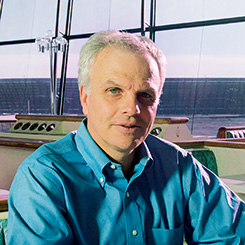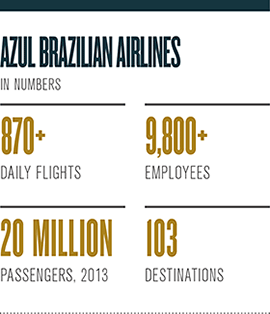
If anybody knows how to turn disappointment into success, it’s American aviation pioneer David Neeleman. This serial entrepreneur founded low-cost Brazilian airline Azul in late 2008, not long after being ousted from JetBlue, the New York low-cost operator that he also founded.
At JetBlue, Neeleman became the sacrificial lamb after a disastrous operational collapse following the Valentine’s Day storm of 2007, which affected much of the northeastern US and left thousands of passengers stranded; some of them for days.
For anybody but Neeleman, a hyperactive individual who suffers from attention deficit disorder – a condition for which he refuses to take medications because he fears it may affect his commercial creativity – the JetBlue setback would have destroyed confidence. Instead, the Brazilian-born businessman started up all over again with Azul (the Portuguese word for blue, in what is surely a sly dig at his old airline). An unabashed workaholic, Neeleman launched the airline in a country which already had two established airlines in Gol and TAM. Up against powerful opposition, he chose to start small and bite off a neglected market – Azul flys between cities that previously had no non-stop service. And in a country where most passengers tend to be the bigger-spending A- and B-class type consumer, Azul is targeting the C-class flier as well.
An unabashed workaholic, Neeleman launched the airline in a country which already had two established airlines in Gol and TAM. Up against powerful opposition, he chose to start small and bite off a neglected market – Azul flys between cities that previously had no non-stop service. And in a country where most passengers tend to be the bigger-spending A- and B-class type consumer, Azul is targeting the C-class flier as well.
“The C-class is growing – there’s 100 million people in the C-class – and half of them now have credit cards”, he explains. “So we are seeing a lot of new travel among people who have never travelled before.”
The launch of Azul, however, was initially greeted with scepticism from many market commenatators. “When I got down there [Brazil],” he told aviation blog Cranky Flyer, “I was giving a speech and one of the airline guys came up to me and goes ‘look dude, you don’t really know what you’re talking about. We’re seeing more people travel, but they are the people who have always travelled. We’re not seeing new travellers.'”
But since it started business, Azul has been seeing both established and new travellers. On one flight between Viracopos and Salvador, Azul started with about 34 people a day. Now the numbers have jumped to well over 500. That’s quite a leap for a relatively new company in an established, competitive market.
Neeleman is a fanatic on costs. The backbone of the Azul fleet is the Embraer 195 jet, a cheap-to-run aircraft that gives the airline a cost per trip of about 30-40 percent lower than the opposition. And as Azul became more established, Neelman continued to pursue the low-cost route by introducing the Embraer ATR; a twin-engined, fuel-sipping, short-haul turboprop that has boosted Azul’s margin even more.
Neeleman is convinced that his ADD condition is a commercial advantage, in that it enables him to cut through irrelevancies and focus on keynote statistics and principles. Whether that’s the case or not, it certainly seems to be working for him.
At Azul he has put in place a corporate mission with just two main points. “I want this to be the best place you’ve ever worked and I want every customer to say ‘wow, that was a great flight’. If you can do those things, you’re going to grow and be successful. That’s really it.”

